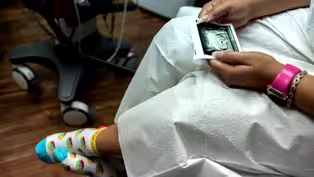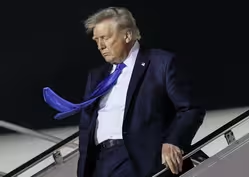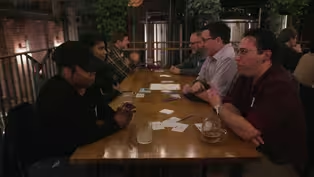
‘Spitfires’ tells the story of American women pilots in WWII
Clip: 5/4/2025 | 5m 50sVideo has Closed Captions
‘Spitfires’ chronicles the daring flights of American women pilots during WWII
Wednesday is the 80th anniversary of VE Day, marking Germany’s unconditional surrender and the end of WWII in Europe. A new book “Spitfires” tells the little-known contribution American women made to that outcome by flying combat aircraft — not for U.S. forces, which denied them the opportunity, but for Britain’s Air Transport Auxiliary. John Yang spoke with author Becky Aikman to learn more.
Problems playing video? | Closed Captioning Feedback
Problems playing video? | Closed Captioning Feedback
Major corporate funding for the PBS News Hour is provided by BDO, BNSF, Consumer Cellular, American Cruise Lines, and Raymond James. Funding for the PBS NewsHour Weekend is provided by...

‘Spitfires’ tells the story of American women pilots in WWII
Clip: 5/4/2025 | 5m 50sVideo has Closed Captions
Wednesday is the 80th anniversary of VE Day, marking Germany’s unconditional surrender and the end of WWII in Europe. A new book “Spitfires” tells the little-known contribution American women made to that outcome by flying combat aircraft — not for U.S. forces, which denied them the opportunity, but for Britain’s Air Transport Auxiliary. John Yang spoke with author Becky Aikman to learn more.
Problems playing video? | Closed Captioning Feedback
How to Watch PBS News Hour
PBS News Hour is available to stream on pbs.org and the free PBS App, available on iPhone, Apple TV, Android TV, Android smartphones, Amazon Fire TV, Amazon Fire Tablet, Roku, Samsung Smart TV, and Vizio.
Providing Support for PBS.org
Learn Moreabout PBS online sponsorshipJOHN YANG: Wednesday is the 80th anniversary of VE Day, the day Germany's unconditional surrender took effect, ending World War II in Europe.
A new book, "Spitfires," tells the little known contribution 25American women made to that outcome by flying combat aircraft not for U.S. forces, which denied them the opportunity when America entered the war.
Instead, they flew for Britain's Air Transport Auxiliary, or ATA.
Earlier I spoke with Becky Aikman, the book's author, and asked her what these women did.
BECKY AIKMAN, Author, "Spitfires": The British were so desperate for help in the war that they sought out pilots from around the world, even pilots with injuries or from other countries, or even women to transport aircraft from the factories to the air bases because they needed to have a huge number of aircraft made available very quickly.
They also transported damaged aircraft back from the air bases to where they could be repaired, often not knowing what was wrong with them until they were high in the sky.
JOHN YANG: How did these American women get involved in this?
BECKY AIKMAN: They were all people who knew how to fly, and they all wanted to participate in the war.
But the United States military would not accept women as pilots.
But they heard that Great Britain would allow women to fly, and they went to Montreal to do a flight test.
25 of them passed.
And they went on ships across the sea to join in this effort.
JOHN YANG: And even though they were just ferrying planes, they were moving them around England.
It doesn't mean they didn't face danger.
I think you said that nearly one in seven died during the war.
BECKY AIKMAN: Yes, one in seven died during the course of the war.
They frequently crashed for a couple reasons.
One is that the aircraft were just coming off those assembly lines so quickly.
They weren't properly tested.
The pilots often got into the air and found that a part didn't work, the engine failed.
They would have to try to glide down and find a flat place to land.
That didn't always work.
They also encountered the changeable British weather.
They did not fly using instruments.
So if they suddenly flew into a cloud, they would lose their visibility and crash into a mountain, wind up too low and hit a church steeple.
People would be killed that way very frequently.
JOHN YANG: Also, there was a wide variety of personalities in this group.
Was there anyone in particular you grew fond of as you researched them and wrote about them?
BECKY AIKMAN: I was fond of all of them, John.
They were all big personalities.
They came from all aspects of American society.
One of them was a debutante from one of America's wealthiest families.
She was known as the Flying Socialite.
Her name was Virginia Farr.
It was for a family of the Western Union fortune.
Another one was an impoverished young woman with an 8th grade education.
Her name was Dorothy Furey, but she was very beautiful.
And when she went to England, she thought she could reinvent herself as she pleased.
She came with one red dress that she recycled and kind of an imperious attitude.
The British assumed that she was some sort of American aristocrat and she wound up joining the British aristocracy.
Some were stunt pilots who performed in air shows.
One of them was named Hazel Jane Raines.
She came from what she called a hat and gloves, churchgoing family.
She studied music in college, but afterwards she joined the Georgia Air show where she performed loop de loops and spins while the crowd screamed in terror.
JOHN YANG: As we said that the United States had nothing like this at the beginning of the war.
But Eleanor Roosevelt in particular was championing a U.S. version of that, and it led to the WASPs.
But it was very different from the ATA.
BECKY AIKMAN: Yes.
The WASP was formed partly because American officials studied the success of women pilots in the ATA in Britain and decided, okay, we will allow women to fly delivering aircraft within the United States.
It was a very different experience from the sort of freewheeling atmosphere in Great Britain.
The pilots lived in barracks.
They would fly one or two models of planes within the United States.
But most important, the pilots in Great Britain were admired and respected by the public, who appreciated that they'd come all this way to help.
In the United States there was a lot of skepticism about women pilots, and it was ended by the end of 1944, when the war was still raging, because the public didn't like the idea that women were in cockpits.
JOHN YANG: While in Britain the fliers in the ATA were treated as equals with the flyers in the RAF.
They opened a lot of doors for women, but did they stay open when they came back in post war?
BECKY AIKMAN: It was very difficult.
U.S. Airlines would not hire women pilots.
The U.S. military would not hire women pilots still.
Some of them, however, did manage to achieve a career in aviation by doing really unusual things.
One of them came back and worked as practically a janitor at a flying school, but she spent her time learning to fly helicopters.
She became only the second woman in the United States certified to fly a commercial helicopter.
And she founded the first helicopter charter company in Alaska, which was very successful.
Another one, Anne Wood, used the war to develop contacts within the society that was in London.
Expatriates, diplomats, business people, journalists, spies, generals.
After the war, she worked her way up and became the first woman vice president of a U.S. airline, which was Pan-Am.
JOHN YANG: Becky Aikman, author of "Spitfires."
Thank you very much.
BECKY AIKMAN: Thank you.
Family planning clinics lose funding over support for DEI
Video has Closed Captions
Clip: 5/4/2025 | 4m 21s | Family planning clinics lose Title X funding over statements supporting DEI (4m 21s)
How auto parts tariffs may affect new and used car prices
Video has Closed Captions
Clip: 5/4/2025 | 5m 2s | How tariffs on imported auto parts may affect car prices and repair costs (5m 2s)
News Wrap: Trump says he wants to continue mass deportations
Video has Closed Captions
Clip: 5/4/2025 | 2m 10s | News Wrap: Trump wants to continue mass deportations despite Supreme Court ruling (2m 10s)
Why young adults finding themselves are lonelier than ever
Video has Closed Captions
Clip: 5/4/2025 | 6m 10s | Why young adults are lonelier than ever and what can be done to help (6m 10s)
Providing Support for PBS.org
Learn Moreabout PBS online sponsorship
- News and Public Affairs

FRONTLINE is investigative journalism that questions, explains and changes our world.

- News and Public Affairs

Today's top journalists discuss Washington's current political events and public affairs.












Support for PBS provided by:
Major corporate funding for the PBS News Hour is provided by BDO, BNSF, Consumer Cellular, American Cruise Lines, and Raymond James. Funding for the PBS NewsHour Weekend is provided by...



